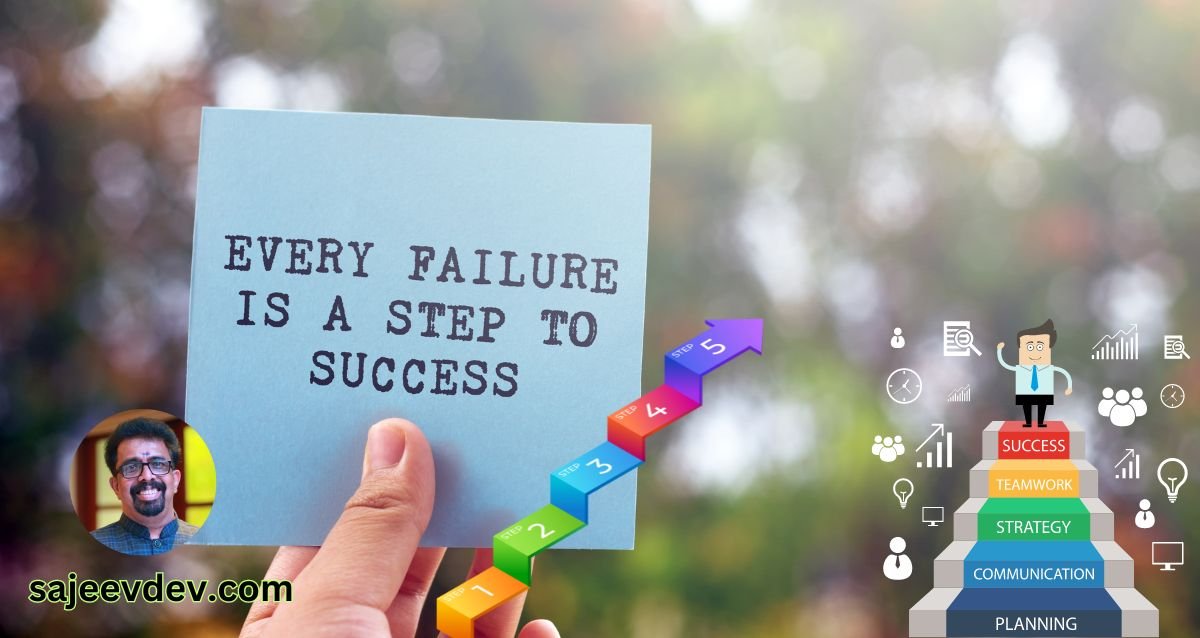The Fear of Failure
Failure is often perceived as a negative experience, something to be avoided at all costs. This fear of failure can be deeply ingrained in individuals, influenced by societal norms, personal experiences, and cultural narratives. Many people grow up hearing that success is the ultimate goal, and failure is synonymous with defeat or inadequacy. As a result, failure can evoke feelings of shame, embarrassment, or disappointment, leading individuals to avoid situations where they might fall short.
Societal pressures exacerbate this fear, as social media and other platforms often portray success in a glamorous light while neglecting the hard work and persistence that typically underlie achievement. These portrayals can lead to unrealistic expectations, making individuals feel that they must succeed without failure, further entrenching their fears. Moreover, in professional environments, the stigma associated with failure often discourages innovation and risk-taking. This culture of fear can inhibit learning, creativity, and ultimately personal and professional growth.
Personal experiences also play a significant role in shaping our fear of failure. For some, early setbacks in academic or social settings can lead to long-lasting insecurities. An unsuccessful attempt at a job interview or a failed business venture can reinforce the belief that failure reflects one’s worth or capabilities. Thus, individuals may internalize failures, viewing them as definitive conclusions rather than as opportunities for learning and development.
Recognizing this pervasive fear is crucial for shifting our perspective. By redefining failure, we can begin to view it not just as an endpoint but as a vital part of the journey toward success. Embracing failure as a stepping stone encourages resilience, fosters a growth mindset, and ultimately paves the way for greater achievements.
The Relationship Between Failure and Learning
Failure is often perceived as a negative experience; however, it serves as a vital component of the learning process. Each setback offers an opportunity to analyze actions, comprehend shortcomings, and devise improved strategies. Through failure, individuals not only gain a deeper understanding of their capabilities but also learn influential lessons that success typically does not impart. This correlation between failure and learning is evident across various fields, highlighting how critical insights often emerge from mistakes.
In the educational realm, students frequently encounter obstacles during their learning journey. For instance, a student struggling with a challenging concept may initially fail an exam. This failure, while discouraging, can prompt the student to seek assistance, engage in deeper study, and ultimately gain a more comprehensive grasp of the material. Thus, failure catalyzes a more profound engagement with the subject, transforming a seemingly negative experience into a powerful learning moment.
The business world exemplifies a similar relationship between failure and success. Many renowned entrepreneurs have faced substantial setbacks before achieving their goals. For instance, J.K. Rowling faced numerous rejections before publishing the Harry Potter series, which later transformed into a global phenomenon. Her experiences illustrate how failure can foster resilience and adaptability, leading to innovative ideas and successful outcomes. Hence, these examples underscore the importance of embracing failure as a necessary part of the learning process.
Moreover, in the scientific realm, researchers often experience unsuccessful experiments. Each failure sheds light on what does not work, guiding them towards potential solutions. These lessons are instrumental as they refine theories, enhance methodologies, and ultimately contribute to advancements in knowledge. Therefore, by recognizing the intrinsic link between failure and learning, individuals can reframe their perspective, viewing failures not as dead ends but as essential stepping stones on the path to success.
Case Studies: Famous Failures Turned Successes
Throughout history, numerous individuals and organizations have faced significant failures before ultimately achieving remarkable successes. These case studies illustrate how setbacks can serve as critical learning experiences, shaping future trajectories towards triumph.
One of the most celebrated examples is that of Thomas Edison, an American inventor who famously stated, “I have not failed. I’ve just found 10,000 ways that won’t work.” Edison’s relentless pursuit of innovation led to the creation of the electric light bulb and numerous other inventions. However, his journey was fraught with numerous failures and experiments that did not yield the desired results. Instead of succumbing to defeat, he used these failures to refine his ideas, leading to groundbreaking contributions to modern technology.
Another notable figure is J.K. Rowling, the author of the immensely popular Harry Potter series. Before achieving literary fame, Rowling faced numerous rejections from publishers, each one a significant blow to her aspirations as a writer. Living in poverty and grappling with personal challenges did not deter her from pursuing her passion. These experiences ultimately informed her storytelling and character development, resonating with readers worldwide. Rowling’s success is a testament to the power of perseverance and the ability to learn from setbacks.
In the business realm, the story of Apple Inc. and its co-founder Steve Jobs serves as a prominent example of failure leading to success. Jobs was ousted from Apple, a company he co-founded, in 1985. Rather than viewing this as a definitive end, he used this setback to launch new ventures, including NeXT and Pixar. His experiences during this time refined his vision and management style. Upon returning to Apple in 1997, Jobs spearheaded the development of revolutionary products, propelling Apple to become one of the most successful companies in history.
These case studies demonstrate that failure is not merely an endpoint but rather an opportunity for growth and re-evaluation. By embracing setbacks, individuals and organizations can cultivate resilience, ultimately leading to extraordinary success.
The Psychological Impact of Failure
Failure often serves as a profound emotional catalyst, eliciting a wide range of psychological reactions. Individuals may experience feelings of shame, anxiety, and discouragement following failures. These emotional responses stem from the inherent human desire to succeed and be accepted, both in personal and professional contexts. When expectations are unmet, the resultant feelings can erode one’s self-esteem, triggering a cycle of negative thoughts and self-doubt. This psychological burden may lead individuals to avoid risks altogether, stifling creativity and growth.
However, it is essential to recognize that these adverse emotions, while intense, are part of the human experience and can act as a precursory phase to personal development. When individuals confront and navigate their feelings of shame and anxiety, they embark on a transformative journey towards resilience. Cognitive reframing is one effective method to combat negative emotions associated with failure. By reframing failure as a learning opportunity—rather than an insurmountable setback—individuals can shift their focus from what went wrong to what can be learned from the experience. This mindset adjustment fosters emotional agility and cultivates mental fortitude.
The road to recovery from failure can be enriched by developing coping strategies, fostering supportive relationships, and cultivating a growth mindset. By sharing experiences and seeking validation, individuals can alleviate feelings of isolation and inadequacy. Consequently, overcoming the psychological effects of failure not only strengthens one’s mental resilience but also enhances the capacity to face future challenges head-on. In essence, learning to embrace failure as part of the journey towards success leads to a more profound understanding of oneself and strengthens one’s resolve to persevere through adversity.
Transforming Failure into a Growth Mindset
In the pursuit of personal and professional success, embracing a growth mindset is essential. This concept, popularized by psychologist Carol Dweck, emphasizes the belief that abilities and intelligence can be developed through dedication and hard work. This approach stands in stark contrast to a fixed mindset, where individuals view their talents as static and unchangeable. Understanding this distinction is crucial for transforming failure into an opportunity for growth.
When faced with setbacks, those with a growth mindset perceive challenges as a natural part of the learning process. Instead of seeing failure as a reflection of their capabilities, they recognize that it serves as feedback. This positive reframing allows individuals to analyze what went wrong and what can be improved. To cultivate a growth mindset, one must consciously shift their perspective towards failure. This can be achieved through various strategies, such as setting realistic goals, being open to feedback, and practicing resilience in the face of adversity.
Engaging in self-reflection can further enhance this transformation. Regularly evaluating personal experiences and responses to challenges helps in identifying negative thought patterns. By understanding triggers for a fixed mindset, individuals can develop new coping mechanisms. Additionally, surrounding oneself with a supportive network that encourages learning from mistakes can significantly foster a growth-oriented environment.
Ultimately, cultivating a growth mindset involves embracing the idea that setbacks are not the end but rather stepping stones toward success. By redefining failure as a critical component of the learning journey, individuals can enhance their ability to adapt, innovate, and thrive. Emphasizing perseverance and a commitment to continuous improvement not only contributes to personal development but also inspires others to adopt similar attitudes towards their own failures.
Lessons Learned from Failure: Personal Reflections
Failure is often viewed negatively, but upon reflection, it is essential to recognize the invaluable lessons it can impart. Each setback presents an opportunity for personal growth and an occasion to reassess one’s goals and strategies. By engaging in self-reflection, individuals can begin to unravel the complexities of their experiences, ultimately leading to a deeper understanding of themselves. The process of examining past failures allows individuals to forge a personal narrative marked by resilience rather than despair.
One of the most significant lessons learned from failure is the development of perseverance. Facing challenges can be disheartening; however, continuing to forge ahead despite these obstacles reveals one’s true character. For many, these moments of difficulty become defining experiences. They reshape an individual’s perspective, instilling resilience that can pave the way for future success. Drawing from these moments can create a sense of empowerment, as individuals come to appreciate their ability to overcome hardships.
Furthermore, failure can teach the importance of adaptability. Life rarely goes according to plan, and being able to pivot when faced with unforeseen challenges is crucial. Through personal reflection, individuals can identify the areas where they may have succumbed to rigidity in the past. This awareness encourages flexibility, enabling one to adjust their approach as circumstances evolve. By embracing change, individuals can cultivate a mindset that welcomes both success and failure as integral aspects of their journey.
Ultimately, the lessons derived from failure enrich personal growth and foster resilience. Each setback serves as a stepping stone in shaping one’s story, with reflections that highlight the process of learning, adapting, and growing. By engaging in the practice of self-reflection, individuals can transform their narrative of failure into a catalyst for success, enabling rich experiences to inform their path forward.
Strategies for Overcoming the Fear of Failure
Fear of failure is a common barrier that many individuals face when pursuing their goals. To overcome this paralyzing mindset, various strategies can be implemented, empowering individuals to embrace failure as a crucial component of their journey towards success. One effective strategy is to reframe the perception of failure. Instead of viewing it as a negative outcome, consider it an opportunity for growth and learning. This shift in perspective allows individuals to analyze what went wrong and extract valuable lessons, ultimately enhancing their skills and resilience.
Another approach is to set realistic and achievable goals. Break larger objectives into smaller, manageable tasks. This incremental method not only minimizes the overwhelming pressure that often accompanies significant challenges but also provides a platform to celebrate small wins, reinforcing confidence. By meeting these smaller targets, individuals can gradually build their self-assurance, making the prospect of failure less daunting.
Additionally, surrounding oneself with a supportive network is crucial. Engage with mentors, peers, or friends who understand the journey towards achieving goals. These relationships can offer encouragement and constructive feedback, creating a safe space to discuss fears and setbacks. This external support can significantly alleviate the burden of failure, as individuals realize they are not alone in their struggles.
Practicing self-compassion is equally vital. Recognize that everyone encounters obstacles, and it is a natural part of personal or professional development. Treat oneself with kindness during challenging times, rather than succumbing to self-criticism. Techniques such as mindfulness or journaling can also facilitate this process, allowing individuals to acknowledge their feelings without judgment.
Incorporating these strategies can transform the fear of failure into a driving force for achievement. By seeing setbacks as stepping stones, individuals can confidently approach challenges and unlock their potential for success.
Failure as a Stepping Stone: How to Move Forward
Experiencing failure is an inherent part of the journey toward achieving success. The key to turning failure into a catalyst for progress lies in the ability to move forward with intention. One actionable step is to set new, realistic goals that align with the lessons learned from past experiences. By establishing clear objectives, individuals can refocus their efforts and channel their energies more effectively. Striving for achievable milestones allows for the building of momentum, fostering a sense of accomplishment that can help mitigate the psychological toll of previous setbacks.
In addition to goal-setting, it is essential to reevaluate existing strategies. Reflecting on what approaches were effective and what led to failure can provide invaluable insights. This may involve a thorough analysis of methods, resources, and support systems. Adopting a mindset of continual improvement encourages the exploration of alternative paths that may be more conducive to achieving desired results. Embracing flexibility in one’s methods fosters resilience, enabling individuals to adapt to changing circumstances and overcome obstacles that may arise.
Maintaining a positive outlook is another crucial component when moving forward after experiencing failure. Cultivating optimism is not merely about ignoring the negative aspects of an experience; it involves recognizing the value in setbacks. Reframing failure as a learning opportunity promotes emotional resilience, empowering individuals to face future challenges with greater confidence. Positive reinforcement from self-reflection, support networks, and professional development can also enhance one’s motivation to progress. Ultimately, the ability to embrace failure as a stepping stone serves as a powerful reminder that setbacks do not define one’s journey but rather enrich the path to success.
Redefining Failure in Our Lives
Throughout this discussion, we have delved into the multifaceted nature of failure and its crucial role in our personal and professional development. Rather than perceiving failure as a definitive end, it is essential to view it as a valuable learning experience. Each setback presents an opportunity for reflection, growth, and ultimately, success. By embracing failure, individuals can cultivate resilience and adaptability—key traits that foster long-term achievement.
The emphasis on learning from failure allows a shift in perspective. This shift encourages experimentation and risk-taking, essential components in innovation and growth. When we redefine failure, we dismantle the fear that often accompanies it. This fear can inhibit creativity and progress, leading to missed opportunities and stagnation. Hence, understanding that failure is an integral part of the journey can liberate individuals, prompting them to take bold steps toward their ambitions.
Moreover, historical success stories frequently highlight moments of failure as pivotal turning points. Innovators, leaders, and change-makers often attribute their eventual accomplishments to the lessons learned from their failures. By publically sharing their experiences, these individuals serve as powerful reminders that setbacks are not indicators of incapacity but rather stepping stones leading to greater outcomes.
In conclusion, embracing failure is fundamental to our success narrative. By accepting failures as part of our journey and leveraging the insights gained, we enhance our ability to navigate challenges more effectively. Encouraging a mindset of growth and resilience transforms how we approach our goals, allowing us to move forward with greater confidence and purpose. Therefore, let us redefine failure, not as an obstacle, but as an essential component of success.









